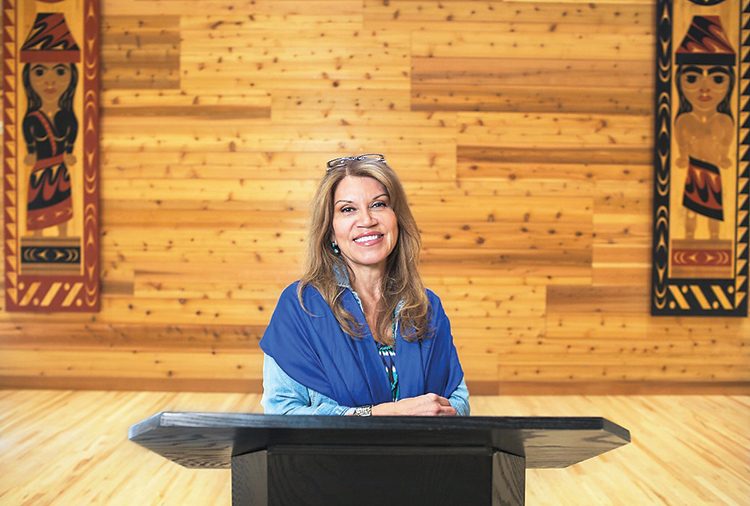Professor offers a vision for weaving Indigenous ideas into UW

Charlotte Coté, an associate professor of American Indian Studies.
Five years ago, wǝɫǝbʔaltxʷ – Intellectual House opened its doors as a home at the University of Washington for Native students, scholars and Indigenous peoples from around the region and the world.
It was born out of a grand vision of “indigenizing the University” by weaving Native understanding into the fabric of campus through enrollment, scholarship and teaching. Now Charlotte Coté (Tseshaht/Nuu-chah-nulth), the American Indian Studies associate professor who chaired the advisory committee for wǝɫǝbʔaltxʷ – Intellectiual House, offers a vision for the future of that work as this year’s Samuel E. Kelly Distinguished Faculty Lecturer. While the lecture was cancelled due to coronavirus concerns, the ideas behind the talk continue to resonate.
Physically, wǝɫǝbʔaltxʷ – Intellectiual House is a longhouse-style building between the Quad and MacMahon Hall—but the structure is much more than a gathering place. It’s part of a larger process to create community among Indigenous faculty, staff and students and catalyze a network of Indigenous communities across academia and beyond, Coté says.
Through events like the annual “Living Breath of wǝɫǝbʔaltxʷ” Indigenous Foods and Ecological Knowledge Symposium, founded by Coté, people from Indigenous communities around the globe are drawn to Seattle to be connected. Maori people from New Zealand participated in last year’s event and are planning to return. Coté is a food scholar, and her research relates directly to healing injustices through community-building around food.
So what exactly does indigenizing the UW mean? It means including the perspectives of Indigenous students, faculty and staff into the larger curriculum, Coté says. “My hope is that the UW will see the wǝɫǝbʔaltxʷ as a starting point … and through respectful dialogue we can begin to break down academic institutional barriers, and Indigenous voices will be included and welcomed in the development of institutional policies, procedure and practices.
“I don’t think we’re there yet,” Coté says. “I think this is just the beginning of something that could create a really important change on campus as long as the University itself wants to see that change.”
While there has been some rise in Indigenous student enrollment since Coté joined faculty in 2001, she hopes that growth trend continues. Indigenous students need to see adequate representation in the UW staff—every department needs Indigenous faculty, not just American Indian Studies, which has itself dropped in number of Native American faculty by 50% in the last two decades, mostly because of retirements, she says.
But “it’s not just about building relationships on campus,” Coté says. “It’s about bringing health and wellness and indigenizing together.” This is part of her ongoing research and her latest project—a book she has been working on since she published “Spirits of Our Whaling Ancestors: Revitalizing Makah and Nuu-chah-nulth Traditions” in 2010.
Her new book aims to extrapolate theory from narrative. Coté describes her work as less like academic discourse and more like returning home: While other scholars might call her methods “community-based participation,” Coté views them as just “talking around a table.” The book will examine the restoration of health and wellness in Northwest Indigenous communities and the centrality of food.